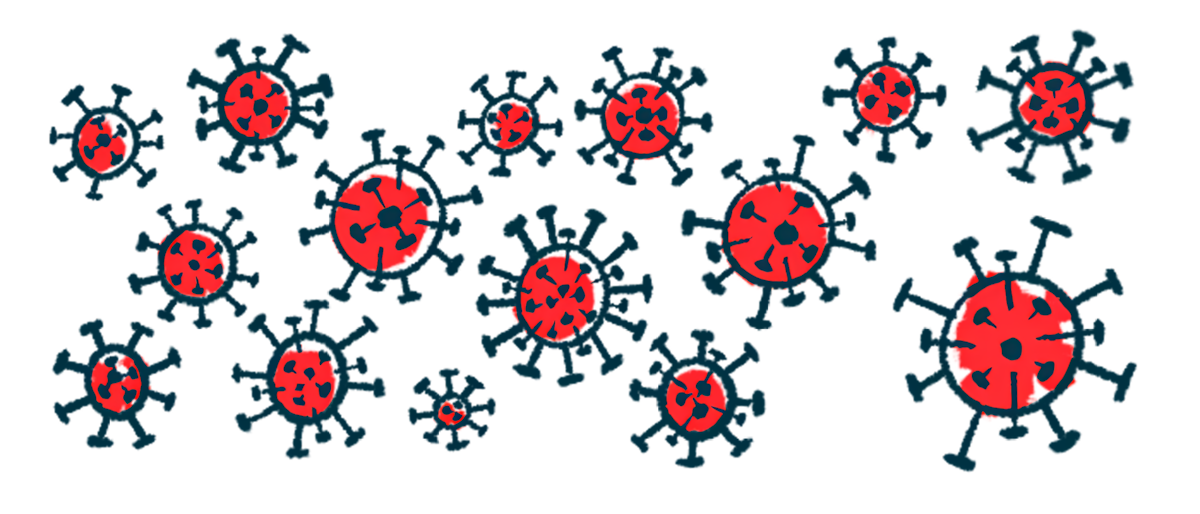Cold sore virus may play role in MS, mouse study finds
Herpes simplex virus found to degrade myelin sheath
Written by |

A common virus that causes cold sores, herpes simplex virus type 1 (HSV-1), may contribute to multiple sclerosis (MS). That’s according to a study by researchers at the University of Illinois Chicago (UIC).
In mice lacking a protein that helps control HSV-1, infection led to the degradation of the myelin sheath, the protective coating on nerve fibers that’s damaged in MS, triggering MS-like symptoms.
When these mice were treated with a molecule that blocks MLKL, a protein that boosts HSV-1 infection, myelin was preserved.
“Our findings enhance our understanding of how viruses develop and offer potential avenues for mitigating viral-induced [nerve cell] damage,” Deepak Shukla, PhD, a professor at UIC and the study’s lead, said in a university news story.
The study, “MLKL‒OPTN axis regulates herpesvirus-induced neurological sequelae,” was published in Clinical and Translational Medicine.
Other viruses linked to MS
In MS, a mistaken immune attack on the myelin sheath also damages nerve cells and oligodendrocytes (the cells that produce myelin), giving rise to various neurological MS symptoms.
One of the strongest risk factors for MS is a history of infection with the Epstein-Barr virus, a type of herpes virus, which raises the risk of developing the autoimmune disorder by more than 30 times. Other herpes viruses, including the varicella-zoster virus that causes chickenpox and shingles, and human herpes virus 6, have also been linked to MS onset and progression.
HSV-1 causes oral herpes, commonly known as cold sores, and is carried by two of every three adults. While most people with HSV-1 have no symptoms, the virus, which infects through the eyes and mouth, can stay in the body for life. It poses a particular risk to people with weakened immune systems.
“If you are infected, then your immune system is constantly locked in battle with the virus,” Shukla said. “And if for any reason you become immunocompromised, the virus can escape and damage your brain.”
In previous work, Shukla’s team discovered a link between HSV-1 and a heightened immune response in the brains of mice, leading to cognitive impairment, lack of coordination, and anxiety. The researchers also identified a protein, optineurin (OPTN), as an antiviral factor that restricts HSV-1 replication and spread. Cells without optineurin were more susceptible to programmed cell death after HSV-1 infection.
Now, the team found that a protein called MLKL boosts HSV-1 infection in the absence of optineurin. Without optineurin, MLKL also facilitated the transport of the virus to the cell’s nucleus, where it replicates. Further experiments confirmed that optineurin controls HSV-1 infection by triggering the degradation of MLKL.
To investigate whether MLKL influences HSV-1 infection in animals, the researchers infected the eyes of mice with and without the gene for optineurin. In line with cell-based results, mice lacking the optineurin protein exhibited higher infection rates four days post-infection, alongside elevated MLKL production.
Imaging studies revealed extensive clumping, or aggregation, of MLKL in the brains of optineurin-deficient mice, but not in control mice, in response to HSV-1 infection. Also, these clumps appeared to trigger the death of myelin-producing oligodendrocytes.
Oligodendrocyte death and myelin loss occurred in brain regions that play essential roles in coordinating movements and maintaining balance.
In behavioral studies, mice lacking optineurin showed significantly impaired motor coordination and shaking behavior after HSV-1 infection.
The team also found aggregates of MLKL in the spinal cords of a standard MS mouse model. There were also lower levels of optineurin protein in regions of MS lesions in brain tissue collected from human patients compared with healthy counterparts.
However, when the team treated optineurin-deficient mice with necrosulfonamide, an MLKL blocker, myelin loss was prevented. In comparison, acyclovir, the standard of care for herpes infections, reduced viral loads but did not reverse demyelination.
“These data suggested that the intricate link between MLKL and OPTN that serves to maintain myelin, with dysregulation of this balance resulting in severe impairments in motor functions and behaviours reported typically in MS and MS-like demyelinating disorders,” the researchers wrote. “Treatment with a MLKL inhibitor demonstrated therapeutic potential by preserving the myelin sheath and reducing neurologic damage during HSV-1 [disease].”

